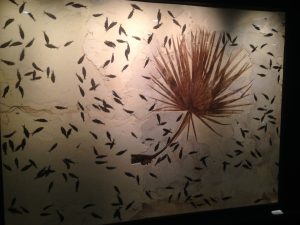This piece originally appeared as a Twitter essay I published on November 4, 2017. I am re-posting it here with minimal edits to improve clarity and formatting.

fossilized fish and plants at the Peabody Museum, New Haven
One: find your beloveds. Find your beautiful soul-kin. Check in with them every day. Tell them they matter. Weather storms together, like schools of fish in rough seas.
Two: Manifest care however you can, to whatever extent is possible in your given circumstances. Choose care. Choose tenderness. Admit to yourself when you are enacting care in name only. Regroup. Restore. Breathe. Ask for help if you can, in your circumstances.
